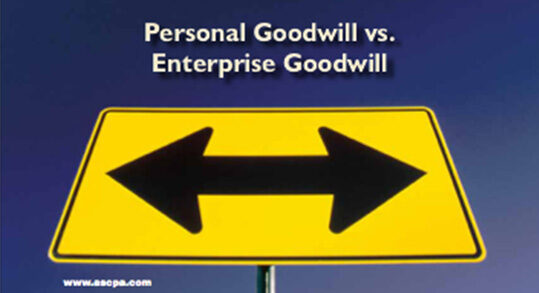
There are situations, in the contexts of tax law and family law, in which allocation of personal and enterprise goodwill is relevant and should be subject to detailed analysis. Although it is not the law in Arizona now, it may be good practice for a family law attorney to argue the distinction between personal and enterprise goodwill and, at trial, be able to provide the trier of fact with a well-reasoned and supportable allocation of goodwill.
Intangible assets represent the excess market value of a business, beyond the value of its tangible assets. An important type of intangible asset, goodwill, is one that cannot be traced to an identifiable source. Examples include patents, trademarks or contracts. For the purpose of this article, we will discuss two important categories of goodwill:
- Personal goodwill (also known as “professional goodwill”) attaches to a particular individual rather than to the business that the individual owns.
- Enterprise goodwill (or “business goodwill”) is derived from characteristics specific to a particular business, regardless of who owns or operates it.
To highlight the differences between these two components of goodwill, consider the following example of two hypothetical beauty salons, “Hair Now” and “Salon Pecan.” The two salons, located a mile apart, have virtually identical ownership structures, assets, liabilities, revenues and net income. Beyond those similarities, the salons have little in common.
Hair Now is at a busy intersection and serves customers on a walk-in basis. Profits are split evenly among the owners. In contrast, Salon Pecan is in a secluded neighborhood and requires customers to make appointments, often weeks in advance, with a particular stylist. Profits are allocated based on the revenue generated by each owner.
Although both salons produce virtually identical benefits for their respective owners, there is a difference in the nature of the goodwill of Hair Now’s owners versus that of Salon Pecan’s owners. The owners of Hair Now receive earnings tied directly to the enterprise, such as its location, business model and mechanism for distributing profit. The owners of Salon Pecan, however, receive earnings tied directly to their personal skills, reputation and repeat clientele. Thus, an owner of Hair Now would typically possess a higher level of enterprise goodwill, and a Salon Pecan owner would have a higher level of personal goodwill.
In a business sale, a Hair Now owner would likely find it easier to transfer to a prospective buyer the goodwill associated with her ownership interest, due to the expectation that the earnings of Hair Now would continue at historical levels regardless of who was working in the business. However, an owner of Salon Pecan would likely have a harder time transferring her goodwill, due to the expected decline in earnings from the regular clients who are more loyal to her than to the salon.
Personal Goodwill in Divorce
Over the years, there has been a great deal of debate within the business valu- ation and legal professions with respect to the treatment of personal goodwill, particularly in valuations performed in the context of divorce. From state to state, there appears to be no consensus as to the proper treatment of personal goodwill: 24 states and the District of Columbia exclude personal goodwill from the marital estate; 19 states (Arizona among them) include personal goodwill in the marital estate, and eight states have no formal precedent.
For several years, the guiding Arizona case was the Arizona Court of Appeals’ 1981 ruling in Wisner v. Wisner (129 Ariz. 333, 631 P.2d 115). In that case, the Court found that the husband’s surgical practice had goodwill value derived from repeat referrals from other physicians and that its value was includ- able in the marital estate.
In an unpublished 2006 decision in Stathakis v. Stathakis (1 CA-CV 05- 0094), the Arizona Court of Appeals discussed the distinction between personal and enterprise goodwill, cit- ing precedent cases in Washington and California. It is currently unclear whether Arizona will follow the lead of Washington and California and find that personal goodwill, as opposed to enterprise goodwill, does not create an item of property that can be valued and divided as a community asset. If the Arizona courts follow the majority in distinguishing between enterprise and personal goodwill, it will become im- portant to segregate between personal and enterprise goodwill when valuing privately held companies and profes- sional practices for marital dissolution purposes.
Segregating the intangible value of a company between enterprise goodwill and personal goodwill is an inherently difficult task. However, a valuation ana- lyst can consider many objective factors in making the allocation. In any company being valued, there will be evidence of various elements of both personal and enterprise goodwill that can be collected through research and interviews with management. The analyst can then consider these factors in the allocation of goodwill. The table below presents common forms of evidence that can be utilized to determine the underlying drivers of excess earnings for the subject company.
In addition to examining the evidence of personal and enterprise goodwill, the analyst can also contemplate a hypothetical sale of the ownership interest being valued. This process involves the consideration of what a willing and qualified buyer would pay for the company if the seller would be permitted to compete in the same line of business in the same general geographic area.
If the buyer would pay very little for the business, due to expected losses of
repeal customers or specific referrals to the newly formed competing entity, this points to a high degree of personal goodwill If the selling owner would be unlikely to siphon business away from the entity that he or she sold, then there would likely be a higher degree of enterprise goodwill.
It Is important to note that any amount paid in a transaction for a non-compete agreement or a consulting agreement is essentially compensating a business owner for his or her personal goodwill. Knowledge of the amounts typically allocated to non-compete agreements and consulting contracts for actual sales within a given industry can also assist the analyst in segregating enterprise and personal goodwill. An important considcration is whether to value the business in its existing state or to assume that a “non-existent” non-compete would be pan of a hypothetical fair market value sale.
The treatment of enterprise and personal goodwill in divorce continues to be an evolving topic in the legal and valuation arenas. By utilizing evidence stemming from the specific facts and circumstances of a particular business valuation, the analyst can more accurately estimate the degree to which enterprise and personal goodwill exist. Utilizing this thorough analysis, a qualified valuation professional can then utilize judgment based on experience to help ensure equitable outcomes in marital dissolution cases.
By Mark R. Hughes CPA, ABV, CFF originally written for the March/April 2012 The Arizona Society of Certified Public Accountants Magazine.


